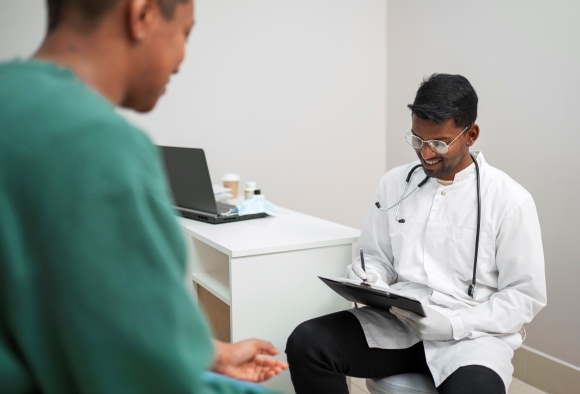By Kate Cohen
At Rosen Medical Center, we are passionate about helping our patients live long, healthy lives. That’s why we recognize the importance of cancer screenings. They can diagnose life-threatening diseases in early stages when they’re easier to treat.

Prostate cancer is one example of a disease that, when detected early, can typically be treated successfully.
Wondering whether you should ask for a prostate cancer screening at your next doctor’s appointment? Here are important facts about screening, who is at risk of having prostate cancer, and the next steps you can take to protect yourself from a late diagnosis.
Why should I care about cancer screening?
When it comes to cancer, awareness and early detection are the two most important ways to protect yourself. Regular screenings can help find many cancers in early stages rather than waiting until problematic symptoms arise.
When a disease like cancer is found early, it is often much easier to treat. Early detection also leads to higher survival rates.
Regular screenings can detect a variety of cancers, including prostate cancer.
Who is at risk of prostate cancer?
One of the most common cancers affecting men is prostate cancer. In the United States, approximately 11% of men will be diagnosed with prostate cancer in their lifetime, and 2.5% of men will die from it.
The lifetime risk of being diagnosed with and dying from prostate cancer is higher for African American men at roughly 4.2%.
Prostate screening is recommended for men at average risk between the ages of 50 and 69.
It is recommended at age 45 for men at higher risk. This includes African American men and men who have a father or brother who were diagnosed with prostate cancer when they were younger than 65.
The median age of death from prostate cancer is 80 years. More than two thirds of men who die from it are over 75.
Other risk factors include a family history of prostate cancer, cigarette smoking, and a diet high in fats and low in vegetables.

What is a prostate cancer screening?
The most common form of prostate cancer screening is a blood test that measures the amount of prostate-specific antigen (PSA) protein in the blood. Higher levels of PSA could be caused by prostate cancer, although it could also be caused by other conditions including a large or inflamed prostate. This sometimes leads to false-positive results.
If testing shows a high PSA level, a doctor may recommend a prostate biopsy to accurately diagnose prostate cancer.
Some screenings may also include a manual digital rectal exam, which will be performed by a doctor. These exams are not as effective as a PSA blood test but can sometimes help a doctor detect cancer in a patient with normal PSA levels.
What are the Benefits of Early Detection and Treatment?
Early-stage prostate cancer is much easier to treat, often preventing death from the disease.
Early prostate cancer usually doesn’t have symptoms. However, problems with urinating or blood in the urine or semen could be signs to get screened.
Advanced prostate cancer can cause trouble getting an erection, pain in the hips, chest or other areas, weight loss, and fatigue.
Talk to Your Doctor about Prostate Cancer Screening at Rosen Medical Center

Ultimately, the decision to get a prostate cancer screening is up to you and your doctor.
Your medical provider will consider age, family history, current health and life expectancy, and your personal values before recommending screening.
At Rosen Medical Center, our healthcare providers believe in the importance of cancer screenings and are ready to discuss your screening options at your next visit.
If you’re 50 – 55, don’t wait to talk to your primary care provider to discuss whether or not prostate cancer screening is right for you. Early detection could save your life.
Make your appointment to discuss prostate cancer screening with your doctor at Rosen Medical Center today.

